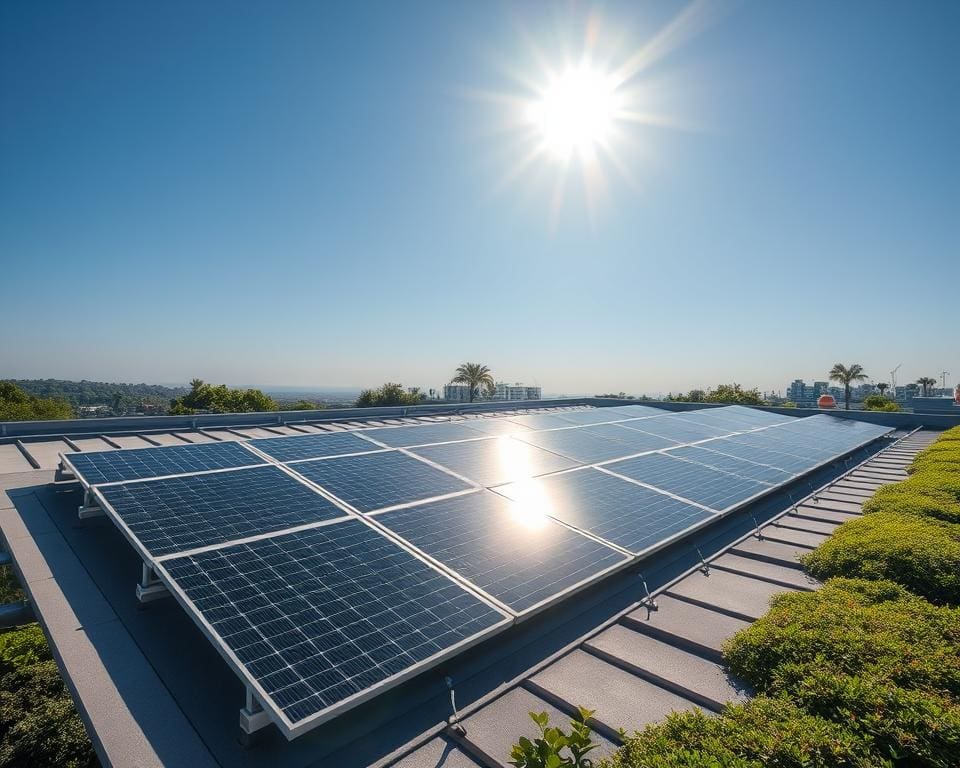As the world increasingly turns to sustainable power, solar panels have emerged as a vital avenue for homeowners in the United Kingdom. By harnessing the sun’s abundant energy, these systems not only provide a cleaner alternative to traditional energy sources but also significantly contribute to reducing our carbon footprints. With the installation of solar panels, households can embrace a lifestyle that prioritises eco-friendliness while simultaneously enjoying long-term financial benefits.
Statistics reveal a remarkable surge in solar panel adoption across the UK, illustrating a growing recognition of their importance in facilitating greener energy solutions. As we delve deeper into the intricacies of solar energy systems, it becomes evident that this technology plays a pivotal role in paving the way towards a more sustainable future.
What Are Solar Panels?
Solar panels represent a remarkable advancement in technology, transforming sunlight into a sustainable clean energy source. These devices operate by converting solar radiation into electricity through the use of photovoltaic cells. The heart of each panel, these cells gather sunlight, initiating the energy conversion process.
Inverters play a critical role in this system, converting the direct current (DC) produced by solar panels into alternating current (AC), which is used in homes and businesses. The mounting structures ensure proper placement and angle for maximum exposure to sunlight, thereby optimising the energy generation process.

Manufactured primarily from silicon and other semiconductor materials, solar panels offer durability and efficiency. As these materials continue to evolve, their effectiveness in harnessing solar power improves, making them increasingly suitable for a variety of applications.
From residential rooftops to expansive solar farms, solar panels serve a vital function in shifting towards renewable energy. This versatility supports individuals, communities, and industries in their pursuit of a cleaner, more sustainable future. Embracing solar technology signifies a commitment to reducing carbon footprints and inspiring a collective movement towards greener living.
How Solar Panels Work
Understanding the functionality of solar panels illuminates the path to harnessing solar energy systems effectively. The remarkable process begins with sunlight, which provides the energy necessary for electrical generation. This section delves into the scientific principles governing solar energy systems and highlights the various types of solar panels available on the market.
The Science Behind Solar Energy Systems
At the core of solar panels lies the photovoltaic effect, which transforms sunlight into electricity. When sunlight strikes the solar panel’s surface, it excites electrons within the photovoltaic cells. This excitation creates an electric current, which flows through wiring connected to your home’s electrical system. As a result, solar energy systems become pivotal in reducing reliance on non-renewable energy sources and promoting sustainable living.
Different Types of Solar Panels
Several types of solar panels cater to various energy needs and budgets. Here is a closer look at the most common types:
- Monocrystalline Panels: Known for their high efficiency and sleek appearance, these panels are made from single-crystal silicon. They typically occupy less space and generate more electricity per square metre.
- Polycrystalline Panels: Constructed from multiple silicon crystals, these panels are usually more affordable but offer slightly lower efficiency compared to monocrystalline models. They are distinguished by their speckled blue hue.
- Thin-Film Panels: These panels are lightweight and flexible, making them ideal for unique installations. While they are less efficient than the other types, their low manufacturing costs can be an appealing factor for many homeowners.
By understanding the different types of solar panels and their operational science, homeowners can better assess which solar energy systems best fit their needs.
Benefits of Solar Energy for Households
Adopting solar energy offers a multitude of advantages for households. The transition to solar panels not only supports the environment but also delivers tangible financial rewards. By utilising this renewable energy source, homeowners can enjoy substantial cost savings and enhance their property’s marketability. The following sections delve into these benefits, shedding light on how solar energy transforms residential living.
Cost Savings on Energy Bills
One of the most compelling benefits of solar energy is the significant cost savings on energy bills. Households can drastically reduce their monthly energy expenses by harnessing solar power. According to recent estimates, families can save hundreds of pounds each year, depending on their energy consumption and local solar conditions. These savings compound over time, leading to a full return on investment within a few years. As technology advances, the efficiency and affordability of solar installations continue to improve, making it an ideal solution for frugal homeowners.
Increasing Your Home’s Value
Investing in solar panels can be a strategic move to increase your home value. Research shows that properties equipped with solar energy systems often command higher prices in the market. Potential buyers are increasingly aware of the benefits of solar energy, viewing it as a desirable feature that promises future energy savings. This trend not only makes homes more attractive but also reflects an eco-conscious commitment that resonates with many buyers today.
Tax Credits and Incentives Available in the UK
Residents in the UK can also take advantage of various tax credits and incentives designed to encourage the adoption of solar technology. The government offers financial incentives that significantly reduce the overall installation costs. These tax credits UK can provide substantial relief, making solar energy more accessible for a wider range of households. By taking advantage of these opportunities, homeowners not only lower their financial burden but also contribute positively to the environment.
Solar Panels: A Greener Energy for Your Home
Solar panels serve as a beacon of hope amidst the growing concerns about climate change and environmental sustainability. By harnessing the power of the sun, these innovative devices provide not just energy but a pathway to a cleaner, more sustainable future. As more households make the transition to greener energy, the benefits of solar panels become increasingly evident.
The environmental impact is profound. Solar energy significantly reduces greenhouse gas emissions, allowing families to lessen their carbon footprints. Integrating solar panels into your home transforms it into a contributor to eco-friendly technology, promoting a collective effort toward sustainability. This transition represents a pivotal change, signalling a commitment to preserving nature for future generations.
Embracing solar panels is not merely a choice; it is a responsibility. By investing in this greener energy, households are not just securing energy independence but are also endorsing a broader movement towards renewable energy sources. Every solar installation represents a step forward on the road to a cleaner planet, reinforcing the idea that we all hold a crucial role in this transformation.
Installation Process for Residential Solar Panels
Transitioning to residential solar panels involves a carefully structured installation process that ensures efficiency and reliability. Selecting the right solar installer stands as a pivotal step in this journey, influencing both the quality of the installation and the overall performance of the solar energy system. By understanding the pivotal elements involved, homeowners can make informed decisions that encourage a smooth transition to renewable energy.
Choosing the Right Solar Installer
Finding a qualified solar installer is essential to the success of the installation process. Look for installers with:
- Relevant Experience: Years of industry experience can provide assurance of their expertise.
- Positive Customer Reviews: Feedback from previous customers helps gauge the installer’s reputation.
- Proper Certifications: Certifications from recognised bodies ensure that the installer adheres to industry standards.
Understanding Installation Costs and Financing Options
The cost of installing residential solar panels can vary, influenced by factors such as the type of panels chosen and the specific roofing requirements. Potential additional expenses may include:
- Permits and inspections
- Inverter and battery storage
- Installation labour
Exploring various financing options is crucial for making solar energy systems accessible to homeowners. Popular choices include:
- Loans: Many financial institutions offer loans tailored for solar energy systems.
- Leasing Agreements: Homeowners can lease solar panels without upfront costs.
- Power Purchase Agreements (PPAs): Pay for the power generated rather than the system itself.
Maintaining Your Solar Energy Systems
Keeping your solar energy systems in top condition is vital for ensuring optimal efficiency and longevity. Regular maintenance allows homeowners to enjoy the full benefits of their investments while addressing minor issues before they escalate into costly repairs.
Essential tasks for maintenance of solar energy systems include:
- Cleaning solar panels: Dust, dirt, and debris can accumulate on the surface, impeding energy absorption. A simple washing with water or hiring a professional can restore optimum performance.
- Monitoring energy output: Regular monitoring ensures your system is functioning as expected. Use a solar monitoring app or device to keep track of performance data.
- Checking inverter performance: Inverters convert generated solar power into usable energy. A malfunctioning inverter can hinder overall system efficiency, so periodic checks are essential.
Homeowners can enhance maintenance by establishing a routine schedule, ensuring that each essential task is consistently performed. Professional servicing every few years may also be prudent, as trained technicians can detect potential issues and recommend solutions.
Common problems such as shading from nearby trees or malfunctioning components may arise. Addressing them promptly not only maintains efficiency but also maximises the longevity of your solar panel system, allowing it to serve you well for decades to come.
The Future of Renewable Energy in the UK
The future of renewable energy in the UK is brighter than ever, with solar energy leading the charge towards a sustainable tomorrow. As the government implements ambitious policies aimed at reducing carbon emissions, investments in renewable resources are set to skyrocket. The target of net-zero emissions by 2050 is not just an aspiration—it’s a necessity that propels the nation to harness the boundless energy from the sun.
Advancements in solar technology are revolutionising energy consumption in households across the UK. With innovations such as solar batteries, smart inverters, and enhanced efficiency panels, families can now enjoy greater energy independence and control over their consumption. As public acceptance of solar energy and green living continues to grow, we move closer to a future where renewable sources significantly outweigh fossil fuels.
Industry leaders predict an exponential growth in solar installations, supported by financial incentives and a commitment from communities to adopt greener practices. The collective shift towards renewable energy opens up new opportunities, not only for households but also for businesses and local economies. Embracing solar energy today paves the way for a cleaner, more sustainable future, embodying the essence of environmentally conscious living that will define the UK of tomorrow.









